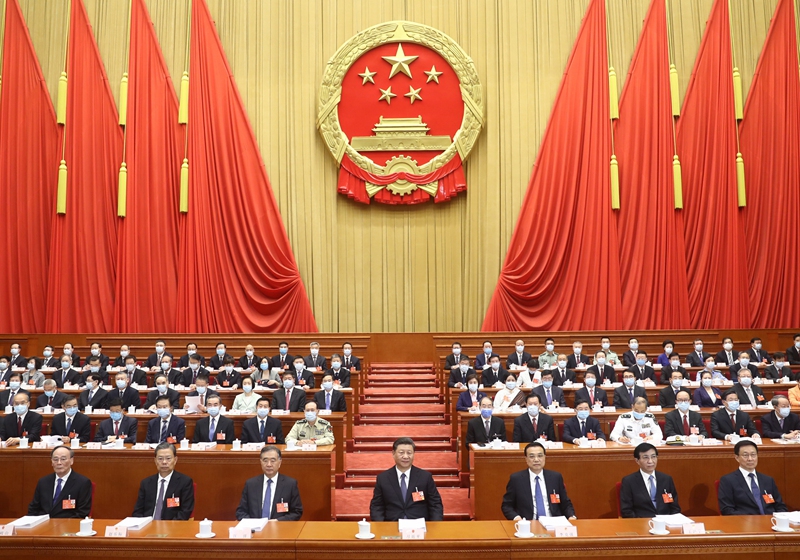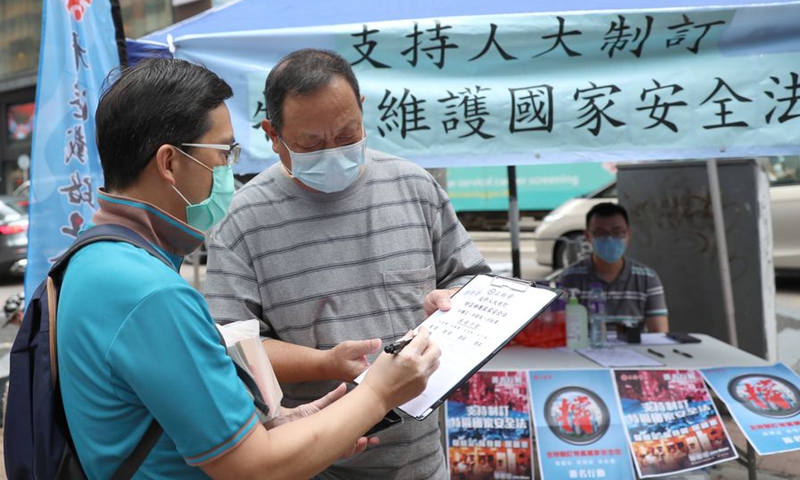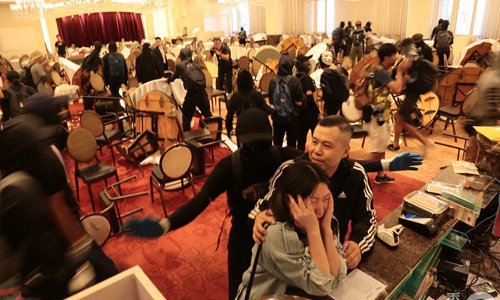China to finish HK national security legislation, reflecting strong will in defending sovereignty
By Chen Qingqing, Yang Sheng and Bai Yunyi Source:Global Times Published: 2020/5/28 22:53:40
Special court to handle national security cases

The third session of the 13th National People's Congress (NPC) ends at the Great Hall of the People in Beijing, capital of China on Thursday. Photo: Xinhua
China has taken the first crucial step regarding the national security legislation for Hong Kong as the country's top legislature passed the decision on Thursday, and experts noted that the next step will be finalizing the legislation in detail and make the law executable in the city within its common law legal system. The legislation will directly strike against the US-controlled proxies and political groups in Hong Kong, who had previously incited trouble in the city with little concern about the consequences.
The National People's Congress (NPC) voted on Thursday to pass a draft decision on establishing and improving the legal system and enforcement mechanisms for the Hong Kong Special Administrative Region (HKSAR) to safeguard national security at the closing of the third session of the 13th NPC. On Wednesday night (Beijing time), US Secretary of State Mike Pompeo reported to the US Congress that "Hong Kong was no longer autonomous from China," threatening to revoke US' favorable trade status of Hong Kong.
The passage of the decision reflected the strong will and determination of the central government and Chinese people in safeguarding sovereignty, which will never be deterred by mounting pressure from the outside, some observers said.
The passage of the decision would be followed by an acceleration of formulating the law, which is expected to take effect in Hong Kong through the Annex III of the Basic Law. While the state-level national security departments are expected to establish special agencies in the SAR, both central-level and local-level law enforcement mechanisms are expected to be enhanced in tackling acts and activities endangering national security, observers said.
The draft stipulates that the relevant legislative responsibilities of the NPC Standing Committee are to effectively prevent, stop, and punish any activity occurring in the Hong Kong SAR territory that attempts to split up the country, subvert state power, organize and perpetrate terrorist activities, including other actions that seriously endanger national security.
The new Hong Kong national security legislation entitles the central government's national security organs to establish agencies in the SAR to safeguard national security, while the chief executive of the Hong Kong SAR government will report to the central government at regular intervals.
The reports will include performance of duties in maintaining national security, conducting national security education, and prohibiting acts that endanger national security according to law, details of the draft show.
The decision was passed by a majority of vote, reflecting that the central government and Chinese people have strong will and determination in protecting sovereignty, and no matter how many measures and steps the US government takes, they would not alter Chinese government's stance and decision, Lau Siu-kai, a vice-president of the Chinese Association of Hong Kong and Macao Studies, told the Global Times on Thursday.
"Though there could be some price to pay, Beijing would be determined in handling long-term problems existing in the SAR," the veteran observer said.

A resident signs in a street campaign in support of national security legislation for Hong Kong Special Administrative Region (HKSAR) in Hong Kong, south China, May 23, 2020. (Xinhua/Wu Xiaochu)
National security 'top priority'Tian Feilong, a Hong Kong affairs expert and associate professor at Beihang University in Beijing, told the Global Times that the passage of the decision on Thursday is the first step, and the next step is to push the legislation in details to make the national security law executable under the common law legal system of Hong Kong (different from the mainland's civil law system), and during the process, all constructive suggestions from scholars, law-enforcement officials, legal professionals and different groups of Hong Kong society are welcome.
"However, it would be certain that the national security law will not be constrained by Hong Kong's common law system. When the law and Hong Kong's legal system see some contradictions in some specific cases in the future, the common law system should make adjustments," he noted.
Leading anti-China and separatist activists in Hong Kong, such as Jimmy Lai Chee-ying, Martin Lee Chu-ming and Joshua Wong Chi-fung, who are mainly responsible for the riots and turmoil starting from June 2019 until now, are highly unlikely to escape from legal punishment, because the one purpose of the legislation is to punish those people who collude with the US and other foreign forces to undermine Hong Kong's stability and public order, mainland Chinese experts said.
"If they continue their illegal activities after the law comes into effect, they will surely be punished; even if they stop their illegal behavior, they would still be punished because the harm they brought to the city and the nation would still exist in the long term, therefore this could be a viable avenue for prosecution, even if the law does not have any retroactive effects to back-tracking the behavior before the legislation was enacted," Tian said.
The decision carries seven parts including stressing to take necessary measures to establish and improve the legal system and enforcement mechanisms for safeguarding national security in the Hong Kong SAR, preventing, stopping and punishing those acts and activities that endanger national security. Compared to the draft decision unveiled for the first time on May 22 by Wang Chen, vice chairman of the Standing Committee of the NPC, the decision approved on Thursday added "activities" in addition to acts endangering national security, which is believed to specifically define the scope of acts and activities targeted by the law.
"The amendments by the NPC Standing Committee would require special law enforcement agencies to implement institutions in Hong Kong for investigation and prosecution, with more detailed laws on how to define those acts endangering national security and their legal consequences," Tian said.
It also clarified that China firmly opposes any foreign interference in Hong Kong's internal affairs by any means, and will resolutely take countermeasures if necessary.
China has announced to sanction a number of non-government associations last December including the National Endowment for Democracy (NED), the National Democratic Institute for International Affairs (NDI), the International Republican Institute (IRI), Freedom House and HRW, as evidence shows these NGOs have supported anti-China forces that have created chaos in the city, and encouraged those forces to engage in extreme violent criminal acts and hyped up separatist activities in Hong Kong.

Radical black-clad rioters vandalize a restaurant of Maxim's in Sha Tin. Source: HK01
Law enforcement enhancedWhile some observers anticipated that the process of formulating and enacting the law would be fully sped up as it's an urgent task to remedy loopholes in Hong Kong's legal system, some suggested that the law could be put into effect in the coming weeks, given domestic terrorism in Hong Kong is on the rise while the secessionists and their subversive activities have been fueled by the support of foreign forces.
"This is a new beginning for the practice of the 'one country, two systems.' We have accumulated experience and lessons in the past 23 years in applying this national policy in the SAR and now we face new challenges, the passage signals our new starting point," Li Xiaobing, an expert on Hong Kong, Macao and Taiwan at Nankai University in Tianjin, told the Global Times on Thursday.
Lau said Pompeo's remarks are "unreasonable, senseless, arrogant, hypocritical and filled with double-standards."
However, orchestrated moves of foreign forces won't shake China's determination to finish national security legislation for Hong Kong to crack down on anti-China activities in the city sponsored by the US and other foreign interests, said Chinese analysts, and they urged the central government to speed up the legislation to clean up the mess in Hong Kong as soon as possible.
A key purpose for the legislation is to deal a blow to US interference in the HKSAR, therefore, the US will surely hit back, however for the Chinese central government, all measures and actions that the US can adopt are fully predictable. No matter what kind of retaliation the US has in mind, China's determination to solve the long-standing issue in Hong Kong will not even be affected regardless of how hard the US will strike back Lau noted.
"We should establish a special court for dealing with cases relevant to national security. Legal systems and enforcement mechanisms constructed at the national level must be able to assume such a basic responsibility," Li said, noting that state and local-level agencies could coordinate while remaining independent in both serving national security interests.
Since blocking US interference in Hong Kong is a key purpose for the legislation, space for US-sponsored or US-controlled forces to act in the HKSAR will be largely squeezed, so that they will be unable to incite more riots and threaten China's national security, Lau said. "One thing is for sure, in the future, the time for pro-US political forces in Hong Kong will be tougher and tougher."
Posted in: POLITICS,FOCUS